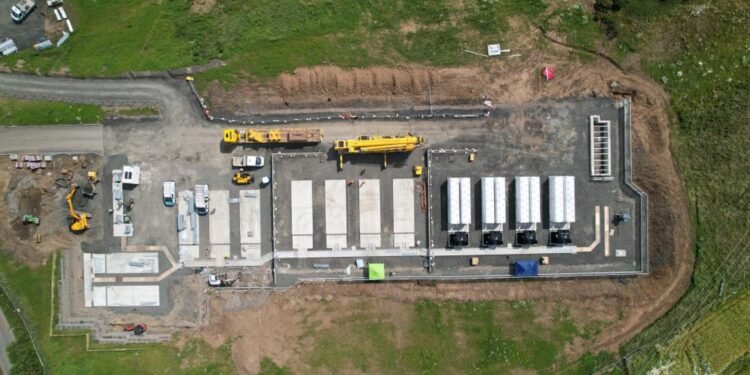The pipeline of battery storage projects in the UK has grown by two-thirds in capacity over the past year, trade association RenewableUK has found.
The industry group’s latest EnergyPulse Energy Storage report shows that the total pipeline of battery projects has risen from 57.1GW a year ago to 95.6GW today, representing an increase of 67.4% or 38.5GW.
This is the second consecutive 12-month period in which the pipeline has increased by two-thirds, RenewableUK said.
The total pipeline of projects includes those that are already operational, as well as those that are under construction, those that have received consent and those that are in the process of being planned. The majority of capacity is yet to be built, however.
According to RenewableUK’s data, 30.4GW of capacity has received consent and a further 30.4GW is at the early stages of development but yet to be submitted for planning permission. Meanwhile, 4.4GW of battery storage capacity is already operational and 4.3GW is under construction.
Notably, the size of individual battery storage projects has also been rising over the last few years. RenewableUK said the average capacity of projects being submitted for planning approval had increased from 27MW in 2019 to 80MW today, representing a rise of 53 MW or 196%.
This comes as the battery storage industry pursues technological advances in a bid to play a significant role in the UK’s energy transition by storing electricity generated by renewable sources during times when such sources are unable to generate power and thus helping to address intermittence issues associated with wind and solar power.
However, it needs to ramp up further still if it is to live up to expectations, including the UK government’s battery strategy.
Battery strategy
According to this strategy, published in late 2023, the UK will need around 6GWh of grid storage capacity by 2040 in order to meet demand. While this is expected to account for the smallest share of demand for battery capacity overall – with the majority of demand coming from the transport sector – nonetheless, grid-scale battery energy storage systems (BESS) are considered by the UK government to be one of the primary uses of battery technology.
This aligns with RenewableUK’s expectations for the role battery storage can play in the country’s energy transition.
“Batteries have a key role to play in ensuring that electricity supply always meets demand,” stated RenewableUK’s director of future electricity systems, Barnaby Wharton. “While there has been significant uptake in projects, we are long way from delivering the 55 GW of short-term flexibility by 2035 that the government says we need in its Review of Electricity Market Arrangements.”
Wharton went on to call for the UK to take steps to help speed up the uptake of battery storage projects.
“We have the potential to move much faster by speeding up the process of consenting and connecting vital energy storage projects to the grid,” he said.
“We’ve just published a report showing that building more battery projects alongside onshore wind and solar farms reduces electricity system costs by sharing land and grid connections, benefiting billpayers in the long term,” Wharton continued.
“By improving the planning system and introducing reforms to financial support mechanisms to encourage more battery projects to co-locate at sites where clean electricity is generated, we can reduce the cost of building and running batteries significantly.”
Recommended for you











